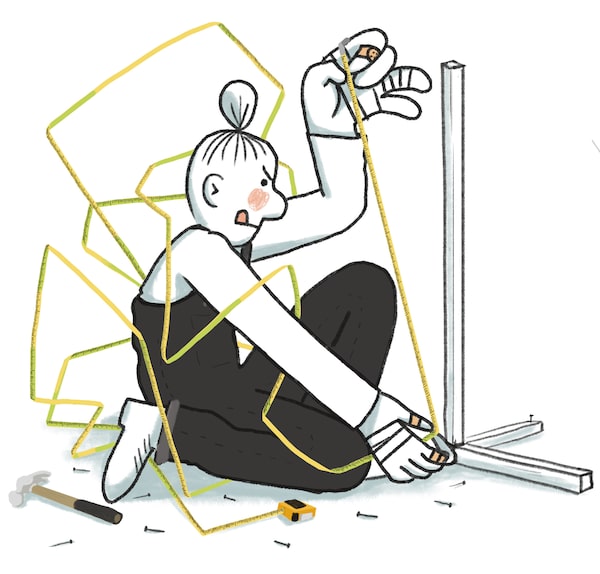
Illustration by Adam De Souza
First Person is a daily personal piece submitted by readers. Have a story to tell? See our guidelines at tgam.ca/essayguide.
As children, we do things we are not very good at. But as we get older, we develop our skills. We work horrible jobs in our teens and early 20s, but eventually we are expected to learn what we are good at and build careers around those things. By our 30s we are expected to have a skill-set that makes us money. But what if the skill-set we have is useless to the world? What if, for example, we are really good at walking on stilts or writing personal essays? What happens then? I guess in that case we would go to our backup skill-set. Well I had none, and I wanted to develop one. So, I did what most unemployed people in their 20s are told to do: I went to trade school.
The program I went into was called “cabinetmaking,” but in addition to cabinets we also made tables and coat racks and footstools and serving trays. It struck me as highly ethical, even moral, to work with wood. I mean, Jesus did it, right? Furniture seemed like a good thing to be able to contribute to the world; a far superior thing to contribute to the world than, say, an essay about how good looking you were at 19. (An actual essay that I sent to a magazine for publication. I have yet to hear back.) I thought it was going to be empowering, wielding power tools and commanding scary machines with ease. Instead, mostly what I learned at trade school is that I am not very good at making furniture.
I mean, at no point did I actually think I was going to be good at building furniture. I’m not handy. Nobody in my family is. As a child, I was given books and art supplies, not tools. My high school didn’t even have a woodshop. My high school had a golf team. Over the course of my life, I have known a handful of people who made furniture, and they all also sold pot.
How involved should I really be in my kid’s school projects?
My mom was excited for me because she thought I’d use this opportunity to find a male suitor, which is another thing I failed to do at trade school, I was too busy stabbing myself with the carving chisels and misreading the tape measure.
At my school, I had the benefit of wonderful faculty who wanted nothing more than to see their students succeed. They did their best, and my various failures should in no way reflect poorly on their teaching abilities. Some of us just aren’t teachable. Sure, I succeeded in making things that had four corners, but the similarities between them and actual cabinets ended there.
In my defense, making furniture is hard. There are all these steps and at every step something could go wrong, and usually did go wrong for me. It doesn’t help that I am not a neat person. I have trouble with even the most rudimentary organizational tasks. At any given time, my toolbox looked like a hurricane had gone through it.
It took only a few days of classes for me to realize that there was literally nothing about myself that was well suited to the task which I was going to be devoting the next year of my life to. But I kept going to class regardless. I tried to wrap my brain around all the math. I did my best to get out of my head and learn to think with my hands. The projects I had to do forced me to problem solve in a way I wasn’t used to before. My brain started to build new neurological pathways and connections. Working in this new physical manner and giving it 100 per cent of my effort had tremendous benefits on my mental health. I came in on weekends to get more practice on the machines. I got over my fear of embarrassment and asked for help at every opportunity.
I spent the year learning in the purest sense of the word and true learning is a humbling experience, especially for those of us who are learning a new skill-set later on in life. And there is something to be said for producing work that is subpar. I mean, I could understand exactly what was wrong with the furniture I made. I just couldn’t fix my mistakes. And yet, I kept showing up. And trying. And failing. And failing again. Until I learned to fail better.
It’s normal to suck at something when you are just starting out, but I pretty much sucked right to the end. Although I built a certain level of familiarity and confidence on the machines, it is important to stress that at no point did I actually ever become good. Nor did I particularly fall in love with woodworking, although I now follow a bunch of woodworkers on Instagram. What drove me was the conviction that I made the decision to do something and I should see that task through to the end.
I finished the program – with honours no less, my marks were boosted by all the written assignments that I did well on. And I did develop a certain skill-set. I now know what all the tools are called. I can drive a screw. Sometimes straight. Having to constantly push myself beyond my comfort zone has made me a more well-rounded person. But most importantly, trade school gave me a more realistic idea of my strengths and limitations. And based on this knowledge I can now proceed with something better suited to my natural abilities, which is, unfortunately, theatre school.
Vera Oleynikova lives in Barrie, Ont.